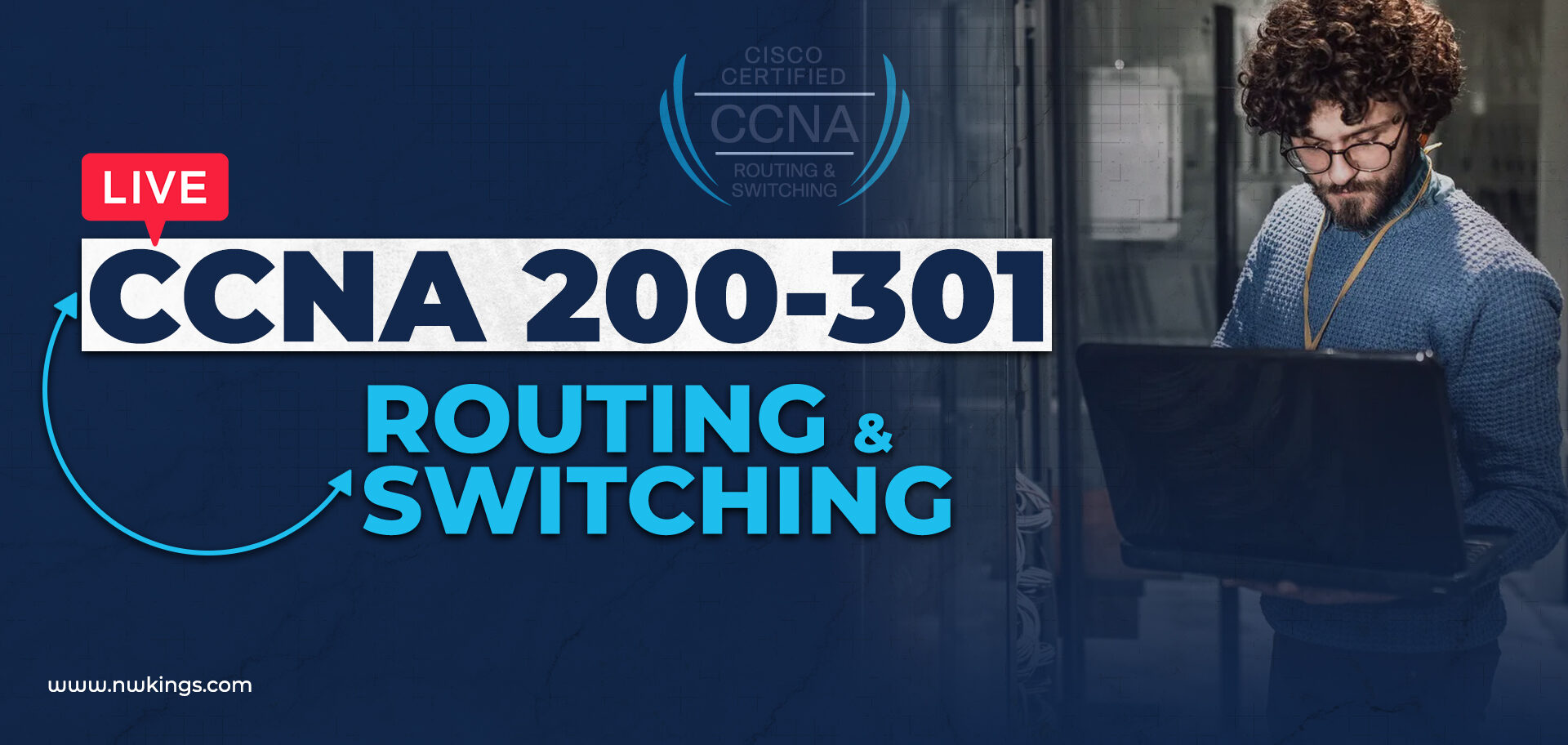
The Cisco CCNA course is a beginner-friendly certification program designed to familiarize individuals with the fundamentals of networking at a basic level. Individuals aspiring to appear for the Cisco CCNA exam look for the updated CCNA syllabus to prepare for their success; therefore, here we are with a blog on the Cisco CCNA syllabus to help you clear the 200-301 exam with flying colours.
Hence, keep reading the blog till the end to know the latest 200-301 syllabus and other exam specifics in detail.
What is the Cisco CCNA program?
The Cisco CCNA program, designed by Cisco, a tech shark, is an associate-level certification program for those interested in stepping into the networking domain in IT.
CCNA is short for Cisco Certified Network Associate and is for beginners who wish to become Network Engineers and earn huge in the industry by becoming an asset to IT.
Why choose Cisco CCNA certification?
One can choose the Cisco CCNA certification to learn the fundamentals of networking. Opting for the Cisco CCNA certification enables an individual to enter the IT networking domain. Candidates desiring to become a Network Engineer can join the Cisco CCNA course as a beginner and shape their career even after graduation.
What skills can I learn with the Cisco CCNA course?
The skills you can learn with the Cisco CCNA course are as follows-
- CCNA Routing and Switching
- Networking Fundamentals
- Network Access
- Routing and Switching Protocols
- Wireless Access Point
- Internet Protocol (IP) Services
- Automation and Programmability
What is the Cisco CCNA syllabus?
The latest Cisco CCNA Syllabus is as follows-
Module 1: Network Fundamentals
Network Components
You will learn about the roles and functions of network components.
- Routers
- L2 and L3 Switches
- Servers
- Endpoints and Access Points
Network Topology Architecture
You will understand the characteristics of network topology architectures.
- 2-tier
- 3-tier
- Spine-leaf
- WAN
- SOHO
- On-premise and cloud
Compare TCP to UDP
Learn the difference between these two Internet protocols.
IPv4 and IPv6 Addressing
- Understand the need for IPv4 addressing
- Configure and verify IPv4 addressing and subnetting
- Configure and verify IPv6 addressing and prefix
Compare IPv6 Address Types
- Global unicast
- Unique local
- Link-local
- Anycast
- Multicast
- Modified EUI 64
Switching
Understand switching concepts.
- A MAC learning and ageing
- Frame switching
- Frame flooding
- MAC address table
Module 2: Network Access
Multiple switches
Configure and verify VLANs spanning multiple switches.
- Access ports
- Default VLAN
- Connectivity
Spanning Tree Protocol (STP)
Understand the need for Rapid PVST+ Spanning Tree Protocol and identify its basic operations.
- Root port
- Root bridge
- Port States
- PortFast benefits
WLAN
Understand physical infrastructure connections of WLAN components.
- AP/WLC management access connections
- SSH, HTTP, HTTPS
- LAN access
- WLAN connection
- WLAN advanced settings
Module 3: IP Connectivity
Routing Table
Interpret the components of a routing table.
- Routing protocol code
- Prefix
- Network Mask
- Next hop
Router
Determine how a router decides by default.
- Longest match
- Administrative distance
- Routing protocol metric
Static Routing
Learn to configure and verify IPv4 and IPv6 static routing.
- Default route
- Network route
- Host route
- Floating static
OSPF (v2)
Configure and verify single area OSPF (v2).
- Neighbour adjacencies
- Point-to-point
- Broadcast
- Router ID
Module 4: IP Services
Network Address Translation (NAT)
Learn to configure and verify inside source NAT using static and pools.
Network Time Protocol (NTP)
Learn to configure and verify NTP operating in client and server mode.
DHCP and DNS
Learn the difference between the role of (Dynamic Host Configuration Protocol) DHCP and (Domain Name System) DNS within the network.
SNMP and Syslog
Explain functions of SNMP in network operations and the use of Syslog features.
- Facilities
- Levels
Per-Hop Behavior (PHB)
Explain the forwarding PHB for QoS.
TFTP/ FTP
Explain the functions of TFTP and FTP in a network.
Module 5: Security Fundamentals
Key Security Concepts
- Threats
- Vulnerabilities
- Exploits
- Mitigation techniques
Security Program Elements
Describe the Security Program Elements.
- User awareness
- Training
- Physical access control
Virtual Private Networks (VPNs)
Define remote access and site-to-site VPNs.
Security Features
Configure Layer 2 security features.
- DHCP snooping
- Dynamic ARP inspection
- Port security
Wireless Security Protocols
Describe wireless security protocols.
- WPA
- WPA2
- WPA3
- WLAN
Learn configuring WLAN.
- WPA2 PSK
- GUI
Module 6: Automation and Programmability
Network Management
Explain how automation impacts network management.
Controller-based and Software-defined architectures
Learn to distinguish between controller-based and software-defined architectures (overlay, underlay & fabric).
- Control Plane
- Data Plane
- Northbound APIs
- Southbound APIs
Device Management
Learn to compare traditional campus device management with Cisco DNA Center.
- REST-based APIs
Describe the characteristics of REST-based APIs.
- CRUD
- HTTP verbs
- Data encoding
Configuration Management
Recognize the capabilities of configuration management mechanisms.
- Puppet
- Chef
- Ansible
JSON (JavaScript Object Notation)
Interpret JSON encoded data.
What are the exam details of the Cisco CCNA course?
The exam details of the Cisco CCNA course are as follows-
Exam Code | CCNA 200-301 |
Exam Level | Associate |
Exam Cost | USD 300 |
Exam Duration | 120 Minutes |
Exam Format | Multiple Choice Questions and Multiple Response Questions-answers |
Total Questions | 90-110 Questions |
Passing Score | 750-850 out of 1000 |
Language | English and Japanese |
Where can I get the best Cisco CCNA training?
You can get the best Cisco CCNA training at Network Kings, where you can learn directly from real-time industry engineers and get 24*7 access to the world’s utmost virtual labs with zero downtime and real-world simulations.
Therefore, enroll today and get a demo session worth USD 45 from the industry experts and 1:1 career guidance free.
What is the scope of the Cisco CCNA certification?
The scope of the Cisco CCNA certification is bright and promising since the domain is in high demand; there are approximately 50,000+ active job vacancies for Network Engineers with CCNA certification. The number will rise at a 10x speed in the coming years.
What are the top job prospects after the Cisco CCNA certification?
The top job prospects after the Cisco CCNA certification are as follows-
- Network Administrator
- Network Engineer
- Network Analyst
- Network Support Specialist
- Systems Administrator
- Technical Support Engineer
- Security Analyst
- Network Operations Center (NOC) Engineer
- IT Consultant
- Wireless Network Engineer
- VoIP Engineer
- Cloud Network Engineer
- Data Center Engineer
- Cybersecurity Engineer
- Network Architect
- Project Manager (IT)
- Senior Network Engineer
- Network Solutions Architect
- IT Director
- Network Manager
What salary packages can one expect after completing the Cisco CCNA training?
The salary packages one can expect after completing the Cisco CCNA training in different countries are as follows-
- United States: USD 72,000 to USD 107,000 per year
- Canada: CAD 51,000 to CAD 96,000 per year
- United Kingdom: £25,000 to £55,000 per year
- Germany: €40,000 to €70,000 per year
- Australia: AUD 60,000 to AUD 100,000 per year
- United Arab Emirates: AED 100,000 to AED 250,000 per year
- Saudi Arabia: SAR 100,000 to SAR 180,000 per year
- Qatar: QAR 80,000 to QAR 180,000 per year
- Singapore: SGD 40,000 to SGD 85,000 per year
- India: INR 250,000 to INR 850,000 per year
- China: CNY 122,000 to CNY 280,000 per year
- Japan: JPY 4,500,000 to JPY 8,000,000 per year
- South Korea: KRW 40,000,000 to KRW 80,000,000 per year
- Brazil: BRL 50,000 to BRL 200,000 per year
- South Africa: ZAR 150,000 to ZAR 450,000 per year
Wrapping Up!
The Cisco CCNA program is the most common certification course sought by individuals aspiring to become network engineers. Hence, the blog describes all the mandatory yet crucial details regarding the Cisco CCNA syllabus, exam, and job opportunities.
Thus, do not hesitate to write to us if you have queries or wish to leave feedback on our blog entitled Exclusive Cisco CCNA Syllabus: The Know It All Guide, and stay tuned to read our next blog on the Cisco CCNP Enterprise syllabus.
Happy Learning!



